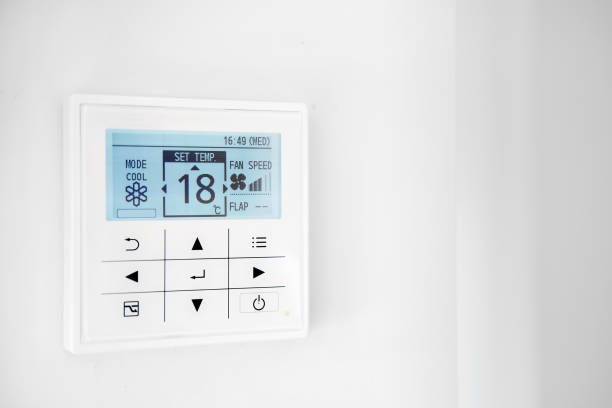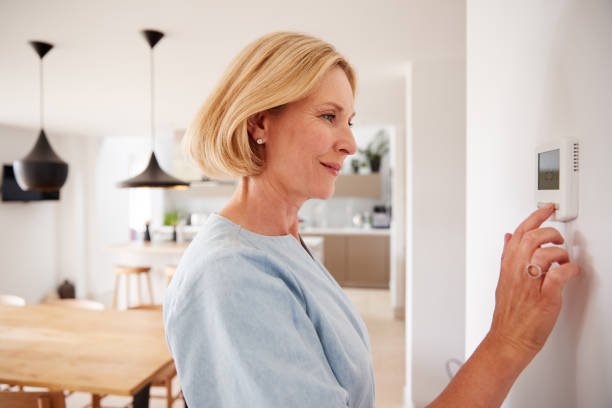Tech
New geek trend: Technology for house heating
Enthusiasts known as "heat pump geeks" are eager to prove that the UK is ready to embrace heat pump technology. Mick Wall, an IT worker, has installed gadgets in his 1930s house to monitor energy consumption and optimize his heat pump. A website, heatpumpmonitor.org, features real-time results from 12 homes around Britain, including Wall's. A heat pump produces three kilowatt hours of heat for every kilowatt hour of electricity consumed, with the ratio known as the coefficient of performance (COP). Proper installation and sizing of a heat pump are crucial for optimal performance, and Richard Lowes of the Regulatory Assistance Project suggests that some homes may already be suitable for a heat pump without the owners realizing it. The cost of installation varies depending on the device size and home requirements, but a heat pump is likely to pay for itself within its lifetime.
Advertisement

Mick Wall, an IT worker in Sheffield, has installed a range of gadgets in his 1930s semi-detached house to monitor energy consumption and optimize his recently installed heat pump. Despite the UK government’s target of 600,000 annual heat pump installations by 2028, fewer than 50,000 are currently fitted in British homes each year. Redrow, the first UK builder to make the commitment, plans to fit heat pumps as standard in upcoming developments.
However, a group of enthusiasts, known as the heat pump geeks, are eager to prove that the country is ready to embrace the technology. These enthusiasts, including IT worker Mick Wall, regularly share data online to demonstrate the effectiveness of their heat pumps. Mr. Wall states that he is putting himself out there to show that the technology works and to provide evidence of its success.
Real-time results from 12 homes across Britain, including Mick Wall’s, are featured on heatpumpmonitor.org, a website that uses OpenEnergyMonitor to track household energy consumption. Heat pumps work by absorbing heat from the outdoors and passing it into a home via a refrigerant. A well-installed heat pump can produce three kilowatt hours (kWh) of heat for every kWh of electricity consumed, with the ratio known as the coefficient of performance (COP). Heat pump enthusiasts use the COP as a means of judging the performance of their device. However, COP can vary depending on factors such as weather and radiator temperature.
Mr. Wall is excited about his heat pump’s COP of 4.5, which means he’s getting 4.5 kWh of heat for each kWh of electricity his heat pump consumes, even though it’s only six or seven degrees Celsius outside. A COP of 3 or higher is considered very good because running a heat pump would be cheaper than running a gas boiler for equivalent heat output, depending on energy tariffs. However, there are conditions to consider, such as the need for upgrades to radiators and pipework, proper installation and sizing, and solar panels to reduce electricity costs.
According to Richard Lowes at the Regulatory Assistance Project, some homes may already be suitable for a heat pump without their owners realizing it. If a home can still be heated reliably with water at around 50-55C or lower, it might be able to replace its fossil fuel boiler with a heat pump. A heat loss calculation and heat pump survey can confirm this. The cost of installation will vary depending on the device size and the home’s needs to make it heat pump-ready. Installing a heat pump can be expensive, but it is likely to pay for itself within its lifetime. At present, households in England and Wales can apply for a £5,000 grant to lower the overall cost, given the high cost of energy prices, making heat pumps more cost-competitive with gas and oil boilers.

Dr Lowes is a meticulous monitor of his heat pump system, with multiple devices measuring energy consumption and heat output. His renovated terrace in Cornwall has been averaging a COP of 3.5 across the year due to proper insulation before the heat pump installation. While most people who install a heat pump may not have access to detailed data, monitoring devices like those used by Dr Lowes and Mr Wall allow them to track their system’s performance more closely. Dr Lowes believes that this data can help improve heat pump efficiency and build valuable knowledge in the process.While heat pump enthusiasts like Mick Wall and Richard Lowes monitor their heat pump system and track their energy consumption closely, not everyone requires such detailed data.
Britton had a heat pump installed in her 1930s home in Falmouth last year and hasn’t yet used any heat metering devices, but is happy with the energy savings. With rising gas prices and evolving heat pump technology, heat pumps have become more cost-competitive with gas boilers. Proper sizing and installation of a heat pump are crucial to ensure its optimal performance, and gathering detailed performance data can help prove its efficiency. Mick Wall’s heat pump runs automatically and adjusts itself according to the weather, keeping the house warm, and has received positive feedback from other members of his household.
Trending Topics

Standard Chartered Bank Nigeria: Learn more!
Standard Chartered Bank Nigeria is committed to promoting sustainability and corporate social responsibility in the communities it serves.
Keep Reading
Review Heritage Bank
Empower your financial future with a loan from Heritage Bank. From personal loans to business loans, we have the loan options you need.
Keep Reading
Keystone Bank Verve Card: Learn More
Take control of your finances and enjoy a range of benefits with the Keystone Bank Verve Card. Apply now and start experiencing all this.
Keep ReadingYou may also like

Branch: Apply now!
The Branch mobile app is designed to be user-friendly and convenient for customers to manage their finances.
Keep Reading
Apply Stanbic IBTC Visa Gold Naira Credit Card
Step up your banking and lifestyle game with the Stanbic IBTC Visa Gold Naira Credit Card. Enjoy exclusive discounts.
Keep Reading